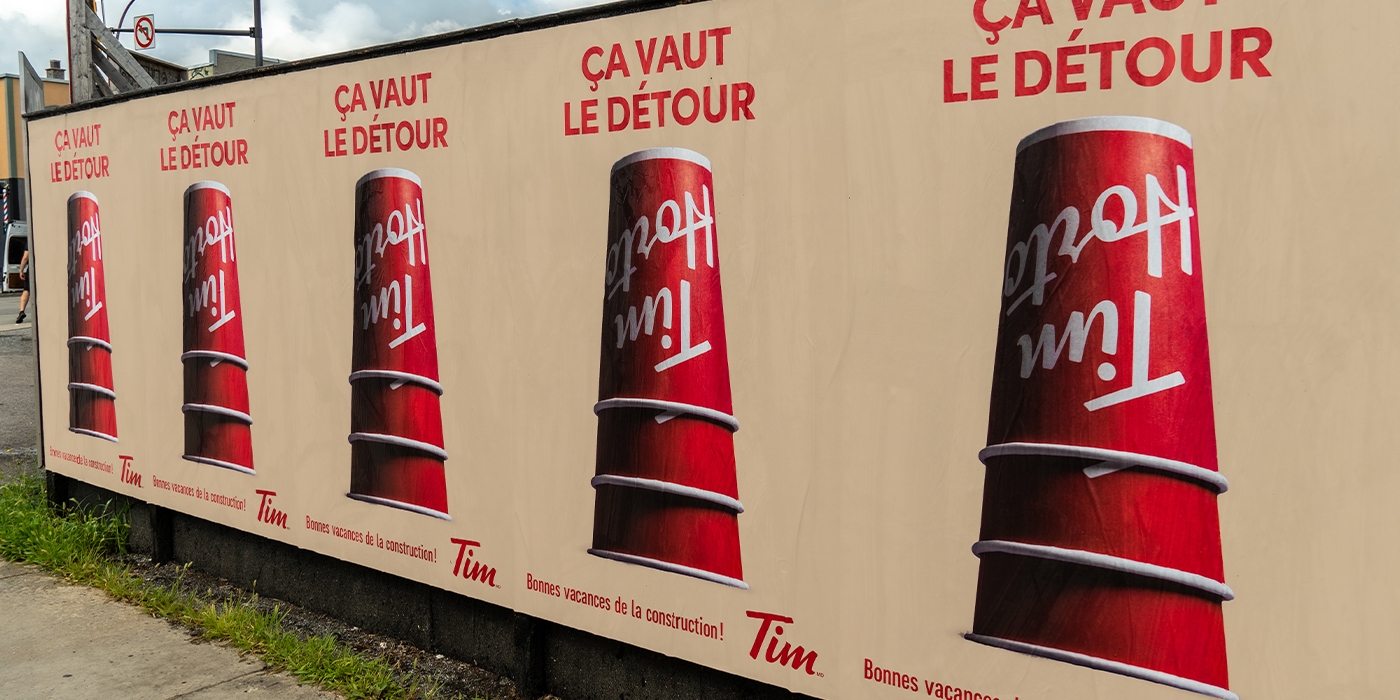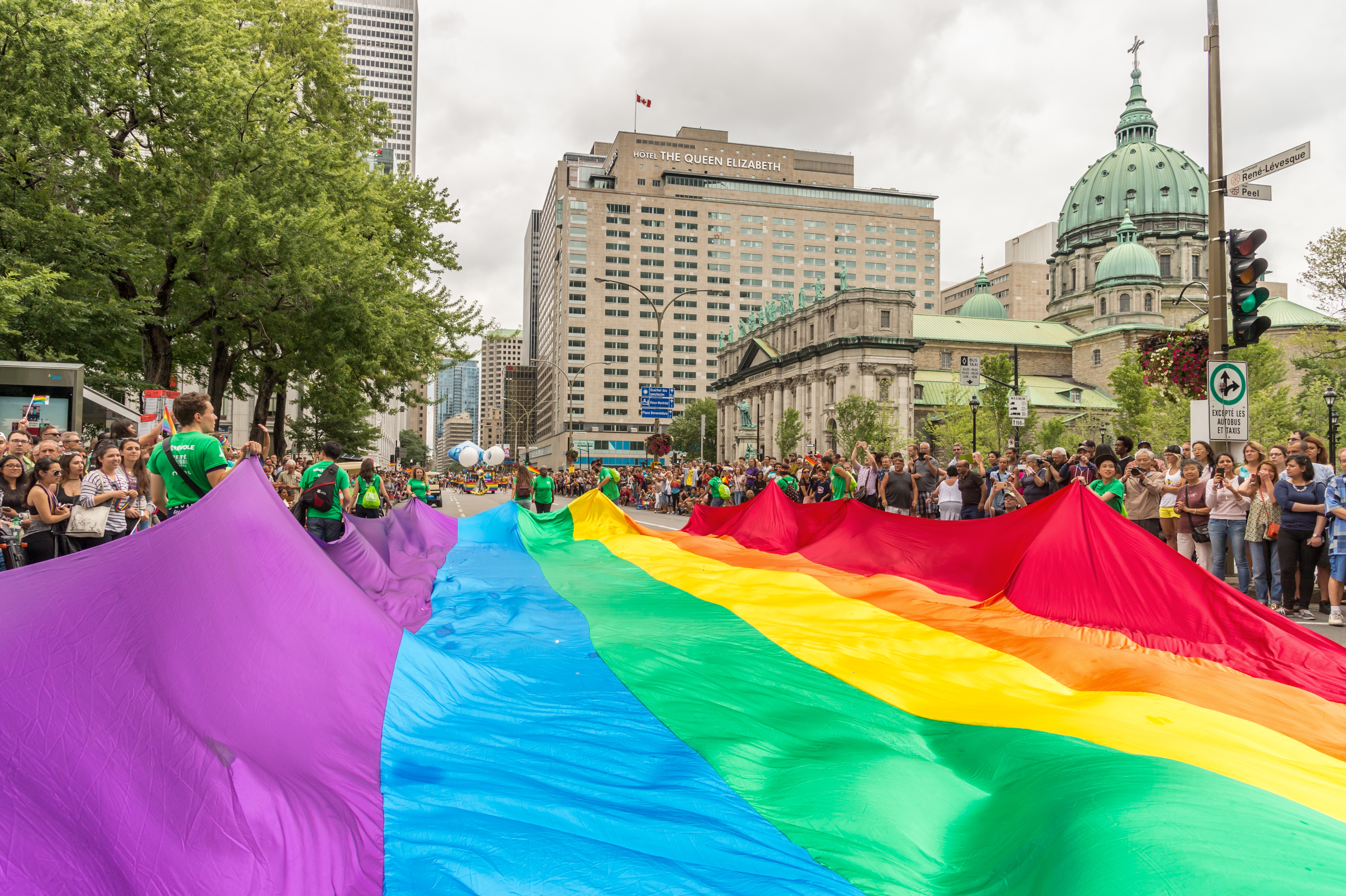on parle

The season of change?
October 2023
Another year, another back-to-school season. Seasons come and go and nothing remains the same, climate change makes sure of it. Floods, forest fires, erratic temperatures… This summer’s weather was a mixed bag, and no one escaped it. According to a Léger survey conducted last year, 73% of the Québécois are concerned about the impact of climate change on their health. Despite these hardships, humans are resilient and always find ways to carry on with their daily lives. When it comes to advertising, communications and culture, here’s what’s worth noting (in our humble opinion).

Construction Holiday: A Golden Opportunity for Advertisers
Every year, during the last two weeks of July, a unique and intriguing phenomenon unfolds in Québec: the construction holiday. Said phenomenon has been an integral part of Québec’s cultural and economic landscape since 1970. During this period, 80% of construction workers take time off, resulting in a temporary slowdown on construction sites and projects across the province.
While relatively unknown to the rest of Canada, this period offers a golden opportunity for advertisers to target construction workers, Québec vacationers, and/or people who decide to stay in town. With thousands of people exploring different regions of the province, as well as those who simply decide to stay in town and enjoy the peace and quiet following the urban exodus, this holiday offers fertile ground for the creation of impactful, Québec-specific campaigns.
One smart example of how advertisers can seize this opportunity is a large-scale activation developed by Tim Hortons and The French Shop. The idea was to remind customers that Tims stops are an essential part of every vacation, thus reinforcing the brand’s association with this special time off across the province. The activation was a way for the restaurant chain to underscore its connection with construction workers and all the Québécois who hit the road during these two weeks. To convey this message, a huge sign was suspended by crane over a closed construction site depicting an upside down Tims cup—reminiscent of the famous orange cones— and text that read “Ça vaut le detour” [It's worth the detour]. This contextual display was also plastered on walls near construction sites across the city.
Québec's construction holiday period offers not only a break from construction, but also a prime opportunity for many advertisers. Tim Hortons’ recent activation offers a reminder of how a well-executed advertising strategy can transform a vacation period into a time of growth and consumer connection.
Andréanne Laroche, Account Manager

The Montreal Canadiens Launch a Clothing Line Inspired by the City’s Culinary Scene
Montreal is renowned both locally and internationally for historical and cultural attractions like Expo 67, Cirque du Soleil, and orange construction cones, to name a few. Beyond these notable hallmarks, Montreal sets itself apart through its well-established reputation as a culinary capital and its legendary hockey team, the Canadiens.
With a culinary scene that’s been flourishing for years, Montreal has become a popular destination for foodies from around the world who come to feast on an array of specialties so vast, no tourist could reasonably cram them all into a single weekend trip. If you happen to be planning a visit, take note. While fusion and fine-dining options abound, classics such as bagels, smoked meat and, of course, poutine remain staples and enduring favourites among tourists and locals alike.
As for the Montreal Canadiens, the team’s reputation precedes itself. The franchise represents one of the strongest brands in the province, with the tricolour jersey still commanding the same unwavering reverence since its debut 100 years ago, despite the team’s recent drought. In fact, the team is also known as the Sainte-Flanelle, a name that reflects the almost cult-like devotion that fans have for the club, generation after generation.
With the launch of the Tricolore Sports’ Foodies collection, the official boutique of the Montreal Canadiens brings Montreal’s sports and culinary icons together in a clothing line that recreates the famous CH logo with illustrations of Québec’s most celebrated delicacies. Sweaters, pants, and even dog bandanas are available with these redesigned logos.
The initiative is reminiscent of Nike’s Dunk Low PRM Montreal Bagel Sesame sneakers, which pay homage to Montreal’s most famous bread export. This trend demonstrates how authenticity and cultural relevance can transcend realms, opening exciting new opportunities for brands and industries.
The days when company logos were untouchable are well and truly over. Between Google, which reimagines its Google Doodle almost every day with the help of a dedicated team, and many organizations that change their colours to celebrate special events like Pride, companies are no longer afraid to deviate from the brand playbook to reach the public in different ways and show their support for important causes or local culture.
We’re willing to bet that this double emblem of Montreal will be proudly worn by many and will surely make more than a few people smile. It could even be said that the clothing line delivers a Montreal trifecta, as let’s not forget, Montreal is also a UNESCO City of Design.
Thomas Dayon, Account Director

Québec’s Podcasting Industry is Booming
Podcast: a digital audio file, often in the form of a chronicle, published on the Internet and intended to be listened to on demand. You can listen to podcasts on your phone while walking, in the car on the way to work, or in the gym while working out. In short, it's like radio reinvented in a portable format and in the form of a file rather than a live broadcast.
Personally, I’ve never really understood the appeal of podcasts. I’ve tried, I promise. I downloaded an episode of a popular paranormal fiction series and spent most of the time skipping back to relisten to the bits I missed each time I’d get distracted by squirrels on my walks.
But my experience is far from reflecting the popularity of podcasts in Québec. According to Media Technology Monitor, listenership among French-speaking Canadians increased 49% between fall 2019 and spring 2022. Nearly one-third of adults in Québec report listening to podcasts, and they listen to an average of five podcasts a week. Comedian Mike Ward drew 20,000 people to the Bell Centre for an episode of his show Sous écoute. Beyond that, young creators are growing up in an increasingly digital environment and are keen to learn the technical side of podcast production, which is now taught in CEGEP and university courses.
However, all is not rosy in the podcasting realm, where a certain level of detachment reigns. The ethical rules governing the medium are nebulous, and many podcasts are born and die every day. Success involves mastery of technical aspects, as well as perfecting the arts of conversation and storytelling, and learning the basics of scriptwriting. Independent podcasters need time and discipline to get their projects off the ground. Once they do, these podcasts recorded around the kitchen table or in the dusty depths of a basement compete head-to-head with shows created by media powerhouses like Québecor or Radio-Canada to find their audience. Lastly, creators in pursuit of profitability are likely to be disappointed. Only a handful of people make a living from podcasting in Québec. There’s no pot of gold at the end of this rainbow.
Nonetheless, the future remains bright for podcasting in Québec despite the small size of our market. Indeed, players in the podcasting community are eager to unite and demonstrate the value of Québec podcasts to international streaming platforms such as Spotify, which already offer advertising integration opportunities and resources to target specific audiences with precision. While the market is still finding its footing, the industry is beginning to take shape. The creation of directories like BaladoQuébec, which allows creators to host podcast series for redistribution on established broadcast platforms, is proof that progress is underway.
Arielle Jerbi, Junior Copywriter

Why is Pride Held in August in Québec?
Montreal’s Marche des Fiertés celebration, also known as Fierté Montréal or Montreal Pride, is a vibrant testament to the city’s rich LGBTQ+ culture and history. While many Pride events around the world traditionally take place in June to commemorate the Stonewall riots, in Québec, the colourful LGBTQ+ Pride festivities come to life in August. The decision to hold Pride celebrations during this month results from a multitude of historical, cultural, and logistical factors.
One of the primary reasons is that Montreal’s festival season (July-August) is very lively. The city’s jampacked cultural calendar includes an array of festivals celebrating music, art, comedy, and more. By holding Pride in August, Montreal’s LGBTQ+ community seamlessly integrates its celebrations into this larger tapestry of festivals, fostering a dynamic and inclusive atmosphere. This timing allows Pride participants to take part in a myriad of cultural experiences, contributing to a sense of unity and shared celebration between diverse communities.
Another reason for moving Montreal Pride away from June is to emphasize the event’s distinctive character. Rather than stepping on the toes of other major Pride parades, such as those in New York and Toronto, Montreal Pride has forged its own identity by ensuring that its events don’t conflict with others. The strategic divergence allows the events to shine on their own and attract a diverse international crowd eager for an authentic and unique experience.
By embracing Pride in August, brands have a unique opportunity to increase their impact. While Pride traditionally takes place elsewhere in June, celebrating Québec Pride in August allows brands to stand out from the crowd and foster more lasting connections with their customers. By adopting this calendar, brands show willingness to listen, adapt, and celebrate diversity on a broader scale. In doing so, they touch more lives and leave a positive impression on both local and global audiences.
Diversity knows no boundaries, and neither should brand inclusivity. Those seeking to make authentic connections and reach a wider audience should take this calendar twist into account. By recognizing that Pride flies its rainbow flag in August in Québec, companies can extend their messages of acceptance and equality to more hearts and minds.
Avril Guarino (iel, they/them), Graphic Designer
